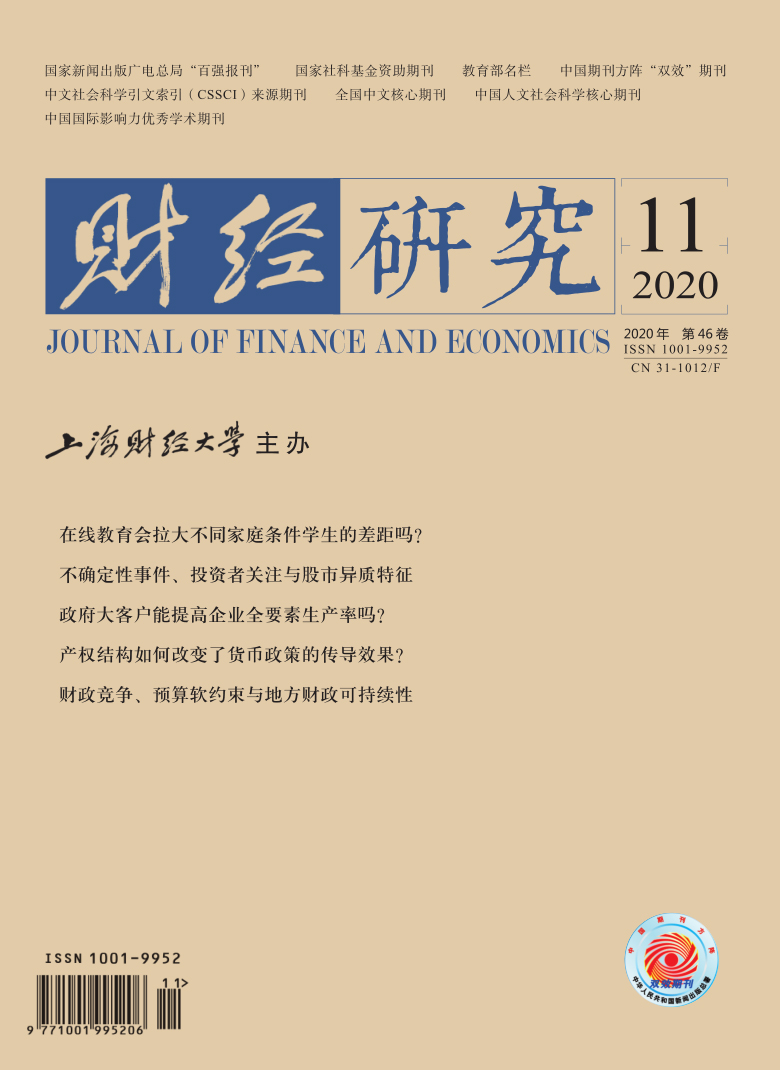新冠疫情期间,在线教育在全国范围内大规模推广。与传统教学不同,在线教育一方面依赖于良好的网络条件,另一方面也对家庭学习环境有更高的要求。因而不同家庭条件的学生在线学习的质量可能会因此而存在差异。文章以新冠疫情作为外生冲击,在准自然实验的场景下,对在线教育的公平性问题进行了探讨。考虑到中西部地区的网络普及率相对较低,文章以中部地区某高三年级和初三年级的抽样样本作为研究对象,考察了家庭条件、城乡和非独生子女等因素对学生在线学习质量的影响。研究发现,贫困家庭和农村家庭学生在疫情后成绩相对下滑。从学科角度来看,贫困因素对高三理科生的影响要高于文科生;在初三年级,非独生子女家庭学生疫情后语文成绩表现更好,男生在疫情后的数学成绩表现更好。文章的研究表明,现阶段普遍推行在线教育会拉大不同家庭条件学生的差距,在积极推动教育信息化的同时需要兼顾效率与公平。
在线教育会拉大不同家庭条件学生的差距吗?——以新冠肺炎疫情为准自然实验
摘要
参考文献
6 刘精明,杨江华. 关注贫困儿童的教育公平问题[J]. 华中师范大学学报(人文社会科学版),2007,(2):120−128. DOI:10.3969/j.issn.1000-2456.2007.02.020
8 罗凌云,风笑天. 城市独生子女与非独生子女家庭教育的比较研究[J]. 青年探索,2001,(6):12−16. DOI:10.3969/j.issn.1004-3780.2001.06.003
11 宋弘, 刘婉琳. 肺炎疫情背景下的教育信息化: 基本事实和政策建议[N]. 澎湃新闻, 2020-02-18.
13 王立胜. 积极应对疫情对脱贫攻坚的影响[N]. 经济日报, 2020-07-07(11).
20 徐驭尧. 让所有学生享受到网课的便利[N]. 人民日报, 2020-03-26(05).
24 智艳,罗长远. 新冠肺炎疫情对中国经济的影响及其思考[J]. 学习与探索,2020,(4):99−105. DOI:10.3969/j.issn.1002-462X.2020.04.014
26 朱武祥,张平,李鹏飞,等. 疫情冲击下中小微企业困境与政策效率提升−基于两次全国问卷调查的分析[J]. 管理世界,2020,(4):13−25. DOI:10.3969/j.issn.1002-5502.2020.04.004
27 Alon T, Doepke M, Olmstead-Rumsey J, et al. The impact of COVID-19 on gender equality[R]. NBER Working Papers 26947, 2020.
28 Alpert W T,Couch K A,Harmon O R. A randomized assessment of online learning[J]. American Economic Review,2016,106(5): 378−382. DOI:10.1257/aer.p20161057
29 Bai Y,Jia R X. Elite recruitment and political stability:The impact of the abolition of China’s civil service exam[J]. Econometrica,2016,84(2): 677−733. DOI:10.3982/ECTA13448
30 Baldwin R, Tomiura E. Thinking ahead about the trade impact of Covid-19[A]. Baldwin R, Di Mauro B W. Economics in the time of Covid-19[M]. London: CEPR Press, 2020.
31 Bettinger E P,Fox L,Loeb S,et al. Virtual classrooms:How online college courses affect student success[J]. American Economic Review,2017,107(9): 2855−2875. DOI:10.1257/aer.20151193
32 Bisbee J, Honig D. Flight to safety: 2020 democratic primary election results and Covid-19[A]. Wyplosz C, Covid economics: Vetted and real-time papers[M]. London: CEPR Press, 2020.
34 Chen Y Y,Zhou L A. The long-term health and economic consequences of the 1959-1961 famine in China[J]. Journal of Health Economics,2007,26(4): 659−681. DOI:10.1016/j.jhealeco.2006.12.006
35 Chen Z H, Alcorn B, Christensen G, et al. Who’s benefiting from MOOCs, and why[R]. Harvard Business Review Digital Articles, 2015: 2−8.
36 Deming D J,Goldin C,Katz L F,et al. Can online learning bend the higher education cost curve?[J]. American Economic Review,2015,105(5): 496−501. DOI:10.1257/aer.p20151024
38 Evenett S J. Sicken thy neighbour:The initial trade policy response to Covid-19[J]. The World Economy,2020,43(4): 828−839. DOI:10.1111/twec.12954
39 Figlio D,Rush M,Yin L. Is it live or is it internet? Experimental estimates of the effects of online instruction on student learning[J]. Journal of Labor Economics,2013,31(4): 763−784. DOI:10.1086/669930
40 Hansen J D,Reich J. Democratizing education? Examining access and usage patterns in massive open online courses[J]. Science,2015,350(6265): 1245−1248. DOI:10.1126/science.aab3782
41 Ivanov D,Dolgui A. Viability of intertwined supply networks:Extending the supply chain resilience angles towards survivability. A position paper motivated by covid-19 outbreak[J]. International Journal of Production Research,2020,58(10): 2904−2915. DOI:10.1080/00207543.2020.1750727
42 Jribi S,Ismail H B,Doggui D,et al. Covid-19 virus outbreak lockdown:What impacts on household food wastage?[J]. Environment,Development and Sustainability,2020,22(5): 3939−3955. DOI:10.1007/s10668-020-00740-y
43 Kim S,Deng Q H,Fleisher B M,et al. The lasting impact of parental early life malnutrition on their offspring:Evi- dence from the China great leap forward famine[J]. World Development,2014,54: 232−242. DOI:10.1016/j.worlddev.2013.08.007
44 Koren M, Pető R. Business disruptions from social distancing[R]. Papers 2003.13983, 2020.
46 Meng X, Qian N. The long term consequences of famine on survivors: Evidence from a unique natural experiment using China’s great famine[R]. NBER Working Paper No.14917, 2009.
47 Shi X S. Famine,fertility,and fortune in China[J]. China Economic Review,2011,22(2): 244−259. DOI:10.1016/j.chieco.2011.02.001
48 U. S. Department of Education and Office of Planning, Evaluation and Policy Development. Evaluation of evidence-based practices in online learning: A meta-analysis and review of online learning studies[R]. Washington, D. C. U. S. Department of Education and Office of Planning, Evaluation and Policy Development, 2009.
49 Wang P F,Chen K Y,Zhu S Q,et al. Severe air pollution events not avoided by reduced anthropogenic activities during covid-19 outbreak[J]. Resources,Conservation and Recycling,2020,158: 104814. DOI:10.1016/j.resconrec.2020.104814
50 Zhang D Y,Hu M,Ji Q. Financial markets under the global pandemic of Covid-19[J]. Finance Research Letters,2020,36: 101528. DOI:10.1016/j.frl.2020.101528
引用本文
罗长远, 司春晓. 在线教育会拉大不同家庭条件学生的差距吗?——以新冠肺炎疫情为准自然实验[J]. 财经研究, 2020, 46(11): 4-18.
导出参考文献,格式为:
上一篇:美国对华出口管制与中国企业创新






 8050
8050  11537
11537

